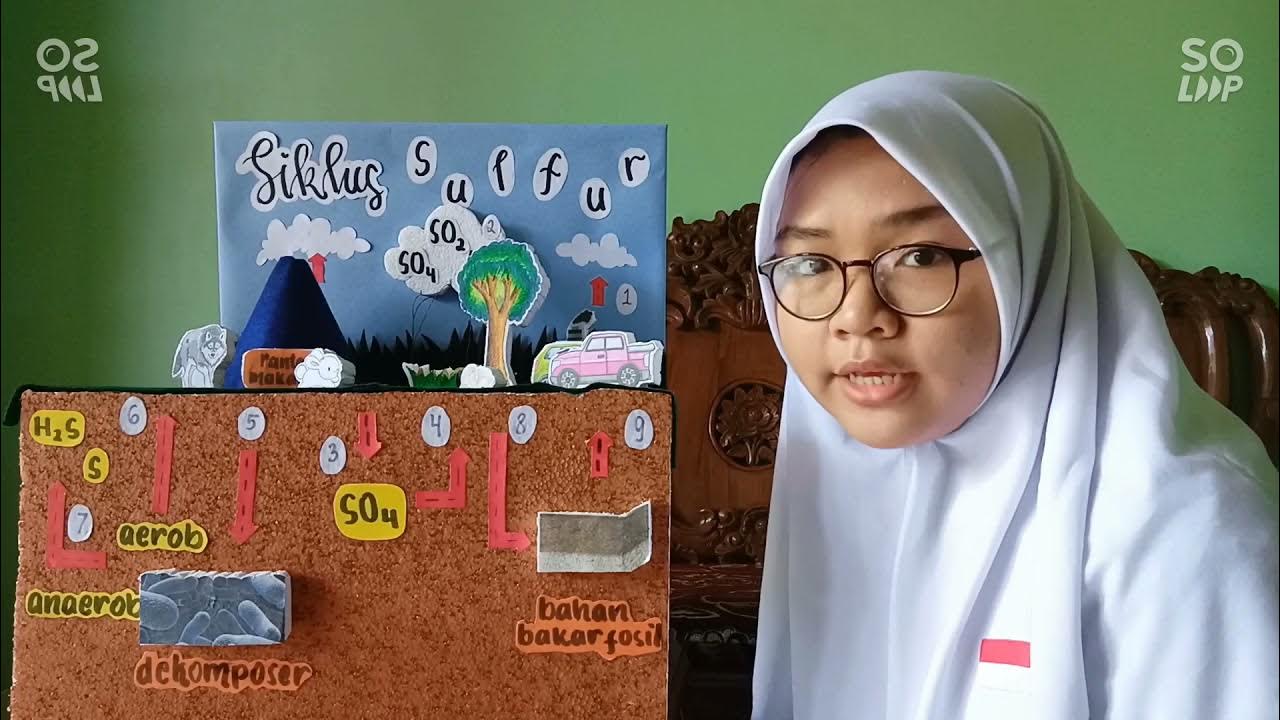Daur Sulfur
Summary
TLDRThis script discusses the sulfur cycle and its importance in the environment. Sulfur, an essential element in proteins, is released into the atmosphere from industrial processes and volcanic eruptions as gases like SO2 and SO4. These gases react with water to form sulfuric acid, leading to acid rain. Acid rain can damage ecosystems, animals, buildings, and metals. Sulfates from rain enter the soil, where they are absorbed by plants and animals. Decomposers break down organic sulfates into inorganic sulfates, which can be reabsorbed by plants. In anaerobic conditions, sulfur compounds like hydrogen sulfide can form. Bacteria also play a role in the desulfurization process, converting sulfates into sulfur and hydrogen sulfide, which are critical in industrial processes.
Takeaways
- 😀 Sulfur (sulfur) is an essential element in the composition of proteins, alongside nitrogen.
- 😀 Industrial emissions and volcanic eruptions release gases such as SO2, SO4H2, and others into the atmosphere.
- 😀 These gases react with clouds and water, forming sulfuric acid, which affects the acidity level of rainfall.
- 😀 Acid rain occurs when the pH level of rainwater becomes too low, threatening living organisms.
- 😀 Acid rain is corrosive to both living organisms and man-made structures like buildings and metals.
- 😀 Sulfate content in acid rain enters the soil, where it is absorbed by plants.
- 😀 Animals obtain organic sulfate through their diet from plants and other organisms.
- 😀 When organisms die, their bodies decompose, and organic sulfate turns into inorganic sulfate, enriching the soil.
- 😀 Aerobic decomposition of sulfate releases sulfur dioxide (SO2), which can be absorbed again by plants.
- 😀 In anaerobic conditions, sulfide (H2S), a toxic compound, may form, contributing to acid rain.
- 😀 Decomposed organisms in the soil can eventually become fossil fuels used in industrial activities.
- 😀 Sulfate in the soil undergoes desulfurization by sulfur bacteria, converting it into sulfur or sulfide, completing the sulfur cycle.
Q & A
What is the role of sulfur in the environment?
-Sulfur is an essential element in the composition of proteins and other organic molecules. It is involved in the sulfur cycle, which is crucial for life on Earth.
How do sulfur compounds enter the atmosphere?
-Sulfur compounds enter the atmosphere through industrial activities and natural events such as volcanic eruptions. Gases like sulfur dioxide (SO2) and sulfur trioxide (SO3) are released during these processes.
What happens when sulfur gases react with water in the atmosphere?
-When sulfur gases react with water in the atmosphere, they form sulfuric acid (H2SO4), which can lower the pH of rainwater, leading to acid rain.
What is acid rain, and how does it affect the environment?
-Acid rain is rainfall with a pH that is lower than normal, often caused by sulfuric acid. It can harm living organisms by being corrosive and can also damage buildings and metal structures.
How does acid rain affect plants and animals?
-Acid rain can damage plants by altering the soil's pH, making it difficult for plants to absorb nutrients. Animals may suffer from health issues or die due to the toxic effects of acid rain.
What happens to sulfate in the soil after acid rain?
-Sulfate from acid rain enters the soil and is absorbed by plants. It becomes part of the food chain as animals consume these plants.
How does sulfur return to the soil after the death of living organisms?
-When organisms die, decomposers break down their bodies, converting organic sulfate compounds into inorganic sulfate, which is then returned to the soil.
What is the difference between aerobic and anaerobic decomposition in the sulfur cycle?
-Aerobic decomposition occurs with oxygen, leading to the formation of sulfuric acid. Anaerobic decomposition occurs without oxygen, producing hydrogen sulfide (H2S), a toxic gas.
What is the process of desulfurization in the sulfur cycle?
-Desulfurization is the process by which sulfur bacteria convert sulfate into hydrogen sulfide or elemental sulfur, a key step in the sulfur cycle.
How does sulfur contribute to the formation of fossil fuels?
-Sulfur compounds in decomposed organic matter, such as plants and animals, can become part of fossil fuels like coal, oil, and natural gas over time.
Outlines

This section is available to paid users only. Please upgrade to access this part.
Upgrade NowMindmap

This section is available to paid users only. Please upgrade to access this part.
Upgrade NowKeywords

This section is available to paid users only. Please upgrade to access this part.
Upgrade NowHighlights

This section is available to paid users only. Please upgrade to access this part.
Upgrade NowTranscripts

This section is available to paid users only. Please upgrade to access this part.
Upgrade Now5.0 / 5 (0 votes)





